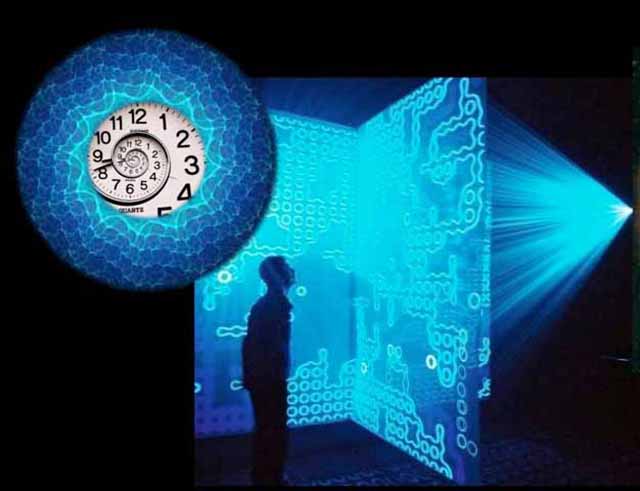活在當下,用更少的時間,做更多的事 —巴夏

問:Hi, Bashar
你好,巴夏!
巴夏:And to you good day
你好!
問:So I'm having this issue of time.
我有“時間”方面的問題
巴夏:Oh! How exciting
哇!太令被奮了
What is that issue?
問題是什麼呢?
問:Well, when I was younger
在我小的時候
time was very easy to figure out
時間,對我來說是很容易搞定的
巴夏:Yes, and now?
那現在呢?
問:And things took a long time
(小時候)我有大把大把的時間
And I had time to do everything
我有足夠的時間做每一件事
And everything so sped up
而且事事都做得很快
巴夏:Yes
是的
But the idea is that
但你要知道
if you're doing more than you need to do
如果你實際做的事,比你本該做的,多得多
It will translate as not having enough time
那就變成:你的時間不夠用
When you trust the synchronicity in the kit of excitement
而如果你相信“興奮”自備的工具之一,即“同步性”
It will organize everything for you
那“同步性”就會為你把每件事都組織好
And you will have time to do everything you need to do
你就有足夠的時間去做你該做的每件事
And what you don't have time to do,you don't need to do.
而你沒時間做的事,就說明你目前不需要做
Does that help?
這對你有幫助嗎?
Or did I take not enough time to explain that?
還是說,我沒花足夠的“時間”跟你解釋?
You want me to go over that again?
你需要我再解說一遍嗎?
問:Yeah!
是的!
巴夏:
Have you heard us talk about the idea that excitement is a complete kit?
你有沒聽我說過,興奮是“完整的工具箱”?
問:Right!
有!
巴夏:
And it contains many different tools.
這個工具箱裡面有很多種不同的工具
One of which is synchronicity.
其中之一就是“同步性”
問:Correct
對的!
巴夏:
So if you're acting on your highest excitement
如果你依照你的最高興奮去行動
That's the first thing you do
也就是你做的第一件事
until you can do it no further.
一直做到你無法再繼續下去為止
Then you act on the next thing in the next and the next
然後你做下一件事,再下一件事,再再下一件事……
The synchronicity in the tool kit of excitement
興奮工具箱中的同步性
Will show you exactly how much time you need to spend on any given thing that is represented of your excitement
會準確地告訴你在哪件你興奮的事情上該花多少時間
And whatever you don't have time to do at the end of the day when you're excited about going to sleep.
而當一天結束時,你興奮地想要睡覺,所以沒時間做的任何一件事
You didn't need to do that day
都說明在這一天,你不需要做這件事
It is actually truly an organizing principle.
同步性是絕對實用的“組織管理原則”
It will show you exactly
它會準確地告訴你:
how many things you need to do
哪些事情是你該做的
When you need to do them.
你該在什麼時候做
How much needs to be done in the day,
一天要做的量是多少
And so forth.
等等……
Let it organize your schedule.
讓它來規劃你的排程
Let synchronicity be your guide.
讓同步性當你的嚮導
And then you will have exactly the amount of time you need to do all the things you actually need to do
然後,你就會有剛好的時間,剛剛好做好你真正需要做的全部的事情
The other things at that moment
而在那一刻,你還沒做的事情
you may not need to do as much as you think you may need to do them.
可能並不像你所想的那樣“需要及時做完”
問:
OK
好的!
巴夏:
Does that help?
這對你有幫助嗎?
問:
Yeah!
是的!
It's just very scary
只是讓人感覺很害怕
巴夏:
And why is that scary if it's a perfect organizational tool
如果它是個完美的組織管理工具
And it's actually showing you what you need to do when
準確地告訴你什麼時候該做什麼事,那它怎麼會讓人害怕呢?
The only reason that would be scary is your not trusting that to be true.
唯一一個讓你害怕的原因,就是你不相信它是這樣運作的
問:
Right
對!
巴夏:
You think you gonna miss something
你覺得你會錯過什麼東西
問:
Yes! Totally!
是的!沒錯!
巴夏:
Well, then you don't understand how the tool works
那說明,你不懂得怎麼使用這個工具
Because if there's something that is truly important for you
因為,如果有什麼事對你真的非常重要
How can you possibly miss it if it's contained in the organizing principle
那它肯定包含在“組織管理原則”中,如此,你怎麼可能錯過它呢?
You think you believe something out?
你認為這件事會在原則之外嗎?
It leaves nothing out that's really relevant.
真正和你相關的事,一件都不會少!
That's one of its traits.
這是它的特點之一
It leaves nothing relevant out
“只要相關,一個都少不了!”
So you can't miss anything.
所以,你什麼都不會錯過
In fact, the only way to miss things is actually spent time that you will miss them by worrying about it.
實際上,唯一會讓你錯過的做法,就是你花時間在那裡擔憂你會錯過它們
Do you understand?
你明白嗎?
問:
Yes
是的!
巴夏:
Worrying that you will miss things makes you miss things
擔心你會錯過,反而讓你錯過
問:
Right
對!
巴夏:
Trusting the flow, you can't miss anything that's really relevant for you
只要你相信宇宙之流,那任何跟你相關的事物,你都不可能錯過
That's how it works
這就是同步性的運作方式
問:
This sort of illusion that I'm living in the 1920s silent movie
我現在有種幻覺,感覺就像生活在20世紀20年代的無聲電影中一樣
where everything just sped up
一切都在加速發生
Versus how things felt you know20 years ago.
相比於20年前
It's literally like a day goes by like 20 seconds
一天很快就過去了,感覺就像只過了20秒
巴夏:
Yes
對的
Things are accelerating
事情確實在加速發生
But things seem to accelerate when you're living more in the moment
你越是活在當下,你會感覺事情發展的越快
Living more in the now, you create less time.
你越是活在當下,你創造的時間就越少
Remember, time is something you are creating
記住,時間是由你創造的
Therefore
因此
If you actually living more in the moment, you're more efficient
你越是活在當下,那你的效率就越高
And therefore, you can do more things with less time
於是,你就可以用更少的時間,做更多的事
Do you understand?
你明白嗎?
問:
Yes
是的
巴夏:
So that's the natural progression to do more things with less time.
(你現在的狀態)是“花更少的時間做更多事情”的自然發展過程
Because you're doing them more in the moment
因為你現在做事情時,越來越專注在當下
問:
Now that makes sense
你說的有道理
巴夏:
I know
有道理,我才說的
問:
And probably why children have so much time on their hands.
也許這就是為什麼小朋友手頭上有這麼多時間
巴夏:
Yes!
對的
But again, watch your definitions.
但再次提醒你,要覺察你的定義
It's your definitions of your relationship to the idea of time
是你對“你和時間的關係”的定義
that make you feel like you don't have enough time
才會讓你感覺到時間不夠用
There is always enough time because you're the one creating it
你的時間,總是夠的,因為創造時間的人,是“你”
問:
Right.
對的!
巴夏:
But if you create more details
但如果你創造了更多的細節
Then you need more time
那你就需要更多的時間
But if you don't need that many details
但如果你不需要那麼多的細節
Then you also won't need as much time
那你就不需要創造那麼多的時間
問:
Right
對!
Work more holistically
以更加全域/整體的視角來工作
問:
Right
對!
Totally make sense, absolutely
你說得太有道理了!
巴夏:
You say on your planet
你們星球上不是有這麼一句話:
Work smarter not harder
苦幹不如巧幹
Work more holistically
以更加全面的視角來工作吧
And then you will need as much time to accomplish things
這樣,你就可以用更少的時間把事情做完
問:
Right
對!
巴夏:
Does this help?
這對你有幫助嗎?
問:
Yeah, totally
是的,太有幫助了!
巴夏:
All right, anything else?
好的!還有別的問題嗎?
問:
Not really
沒了!
巴夏:
All right
好的!
問:
Thank you.
謝謝!
巴夏:
Thank you for your time
謝謝你的時間






